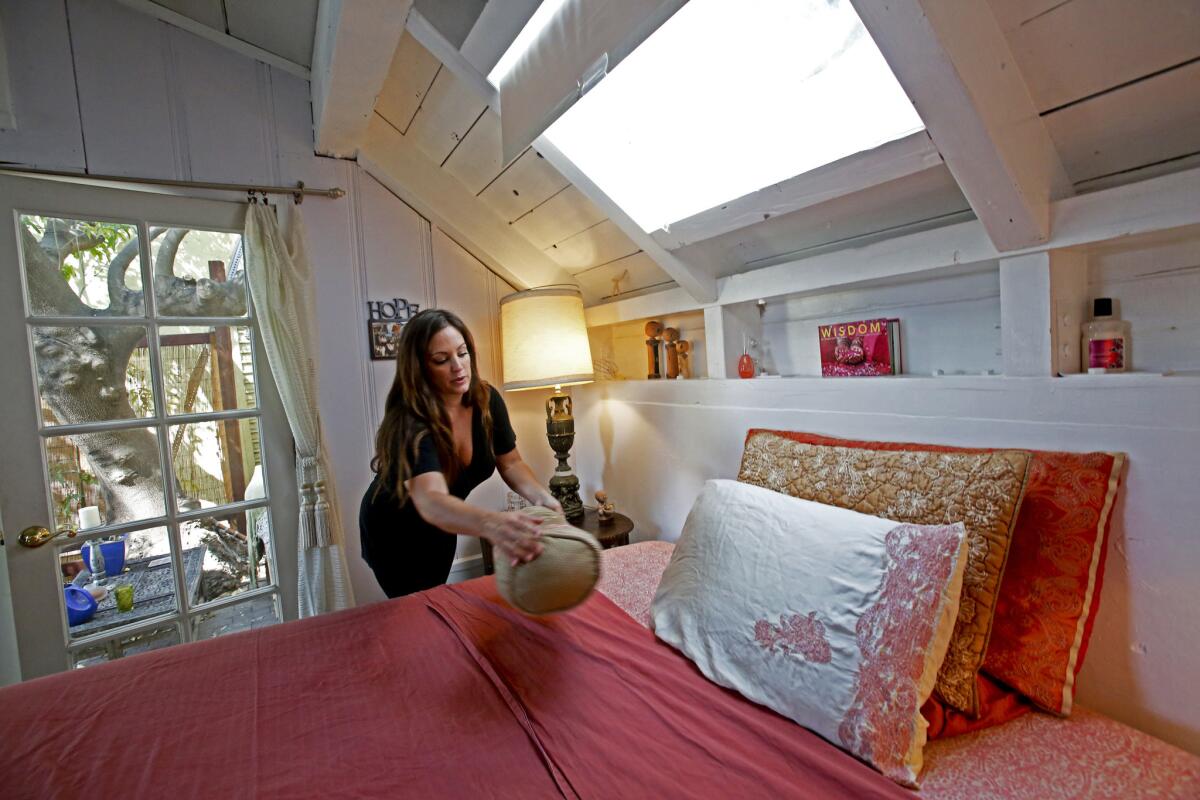Glendale officials adopt Airbnb rules that ban vacation rentals

- Share via
Glendale has adopted rules that will change the way homes and apartments in the city are rented out for short stays on platforms such as Airbnb and VRBO.
On Tuesday, Glendale City Council members voted to ban vacation rentals — where the host isn’t present during a guest’s stay — as part of a short-term rental ordinance that hosts will have to comply with by May of next year.
Home-sharing — where the host is present during a stay of 30 days or less — will be regulated through a permitting process and there will be a tax component.
There will be no cap on the number of days hosts can home-share, following recent direction by council members to remove a proposed 180-day cap.
Discussion at the meeting centered on how the rules will impact local short-term rental hosts, many of whom said they rely on the extra income, versus how the practice affects the local housing stock and quality of life.
Council members appeared split on the issue but ultimately compromised on the ordinance.
Glendale’s code previously did not address the issue of short-term rentals, and the city’s legal staff viewed them as illegal, according to Yvette Neukian, senior assistant city attorney.
Glendale Mayor Ara Najarian took issue specifically with apartments being used as short-term rentals.
“It’s freezing out others who want to make Glendale their home, who want to send their kids to Glendale schools, who want to join the PTA, who want to be involved in the city, who are going to care about picking up that piece of the trash on the street and keeping the noise down,” Najarian said. “That’s a problem for me.”
Councilwoman Paula Devine said it was a challenging decision.
“I do feel for those who need the extra resources to maintain their life, their living conditions as they are used to,” Devine said.
Pushing to seek more data before taking a vote, Devine said, “Are we making up the problem? Are we [creating] a solution for a problem that doesn’t exist?” Councilman Frank Quintero said he would support holding off on a vote to gather more data.
Initially, Devine and Quintero voted against the ordinance, leading to a 3-2 vote in favor of the new regulations.
However, changes to the city’s zoning laws written into the ordinance require four votes, which led to a situation where the permit process for home-sharing was approved, but the practice was technically still barred from residential areas under the city’s code, according to Glendale City Atty. Mike Garcia.
The council then voted to reconsider the ordinance and unanimously adopted it.
Short-term rental listings in Glendale have grown by 33% over the past year, from 510 to 679 listings, according to a city report.
The median nightly rate for a local rental is $210, and most of the listings are on Airbnb, according to the report, citing data from a third-party firm.
Under the new regulations, Glendale residents planning to rent out a room in their house or apartment — with landlord approval — will need to register for something similar to a business license through the city.
Those residents will then be required to report their earnings and pay what’s known as a transient-occupancy tax, or TOT — the same tax hotel operators pay.
Properties with accessory-dwelling units, sometimes called granny flats, cannot participate in any form of short-term rentals.
Those operating vacation rentals will have five months to stop the practice. The same amount of time will be given for those interested in or operating home shares to obtain a license.
Following that period, the city can enforce its ordinance via a combination of citations and legal action, Neukian said during a previous meeting.
After the vote on Tuesday, a group of short-term rental hosts who had attended the meeting gathered outside council chambers and began grappling with what the ordinance will mean for them.
Derek Hof said he will have to sell a house in Glendale he owns and has been renting out on a short-term basis for a little over a year.
“[When someone buys the house], it will be in a price range that’s high enough that it will have no impact on affordable housing,” Hof said, adding that he doesn’t think the ordinance will solve many of the issues it seeks to address.
Glendale resident Jamie Gambell said he supports the regulations, singling out the effect they could have on multifamily housing in the city.
“[I’ve been] hearing too many stories of renters being moved out to make room for landlords turning places into short-term rentals,” said Gambell in a tweet responding to the passage of the rules.
Glendale City Council members weighed adopting short-term rental regulations in December 2016 but held off because there were several active lawsuits involving Airbnb and other home-sharing sites at the time that could shape the city’s approach to the rules.
When an update on those suits was brought before the council in October 2018, council members asked city staff to draft regulations, which were discussed and revised several times before their adoption this week.
Several neighboring cities, including Los Angeles, Pasadena and Santa Monica have also implemented short-term rental regulations.
